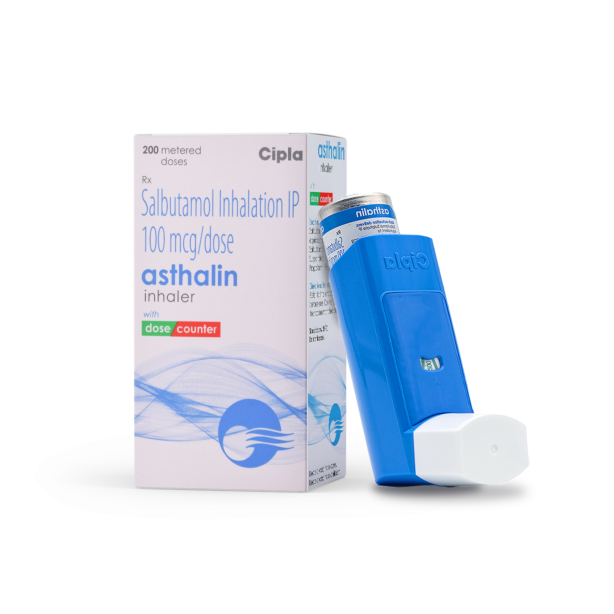Asthma affects nearly 8% of people in the US, causing coughing, wheezing, and trouble breathing. But there is good news, many Asthma medications help open airways and reduce swelling, making breathing and living easier.
These medicines work quickly during attacks or keep symptoms away when taken daily. With proper treatment, most people with Asthma can enjoy active, healthy lives without constant worry.
If you or a loved one has Asthma, learning about the different medication options can bring relief and confidence. Keep reading to find out how Asthma medications work and which types might be best for you.
How do Asthma medications work?
Asthma medications work by helping your airways stay open and calm so you can breathe better. When you have Asthma, the muscles around your airways can tighten, and the airways can swell and fill with mucus. This makes it hard for air to get in and out of your lungs.
Some Asthma medicines quickly relax these tight muscles and open your airways. These are called quick relief or rescue medicines. They are fast at helping you breathe easier when symptoms start.
Other Asthma medicines work slowly to reduce swelling and stop mucus from building up. These are called long-term control medicines. You take them daily to keep your airways calm and prevent Asthma attacks.
Using both types of medicines as your doctor tells you helps control your Asthma and keeps you feeling better.
Save up to 90% on your medicine bills

Aerocort Inhaler 50 mcg + 50 mcg

Bolstran 150 mg Injection

Ventorlin CFC Free Inhaler 100 mcg/18 mg

Asthalin HFA Inhaler 100 mcg
Types of Asthma medications
Asthma medications can be divided into two main types: quick relief (rescue) and long-term control. The selection of medication depends on the types of Asthma, symptom severity, age, and individual response.
Quick-relief medications
Quick-relief medications are essential for stopping sudden Asthma symptoms like wheezing, coughing, or chest tightness. These medicines work fast to open your airways and ease breathing during an acute Asthma attack. Here are the main types:
Short-acting Beta-agonists (SABAs)
SABAs like Albuterol, (also known as Salbutamol) are the most common rescue medications for Asthma inhalers. They work within minutes to relax the muscles around your airways. This fast action helps you breathe more easily. SABAs are safe and reliable for immediate relief, but should not be used as daily control medication.
Anticholinergics
Anticholinergic inhalers, such as Ipratropium, help reduce mucus and open airways. They act slower than SABAs but can be combined with them for better, quicker relief. These inhalers are helpful as acute Asthma attack medication treatment, especially if SABAs alone are insufficient.
Oral corticosteroids
Oral corticosteroids like Prednisone reduce airway inflammation during severe Asthma attacks. They are used for short periods under medical supervision. While effective, they may cause Asthma medication side effects such as mood changes or increased appetite, so doctors recommend careful use.
Combination quick-relief inhalers
Some inhalers combine a Short-acting Beta-agonist and an anticholinergic for enhanced relief. These combination inhalers provide fast and effective symptom control during Asthma attacks. Your doctor will advise if this option suits your needs.
Long-term control medications
Long-term control medications, called Asthma controller medications, help prevent symptoms and reduce Asthma flare-ups. You take these daily to keep your airways calm and open, even when you feel well.
Inhaled Corticosteroids
Inhaled Corticosteroids like Fluticasone and Budesonide are the most trusted Asthma controller medications. They gently and effectively reduce swelling and mucus in your airways. These medicines are FDA-approved and clinically tested for long-term use. Using them daily lowers the need for rescue medication Asthma inhalers.
Leukotriene modifiers
Leukotriene modifiers, such as Montelukast, are oral Asthma medications that block chemicals that cause airway inflammation. They are helpful for people with allergic Asthma needs or those who prefer pills over inhalers.
Long-acting Beta-agonists (LABAs)
LABAs like Salmeterol keep airways open for 12 hours or more. They are often combined with inhaled corticosteroids in one inhaler, offering both long-lasting control and reduced inflammation. For safety, LABAs should not be used alone but always with Corticosteroids.
Combination inhalers
Combination inhalers contain both Inhaled Corticosteroids (ICS) and Long-acting Beta2-agonists (LABAs). Examples include Advair Diskus and Breo Ellipta. These inhalers are easy to use and provide comprehensive Asthma control by addressing complementary aspects of Asthma pathophysiology.
Recent research confirms that ICS/LABA combination inhalers effectively reduce severe Asthma exacerbations and improve lung function compared to ICS alone. Additionally, some studies suggest that once-daily inhalers like Breo Ellipta may improve adherence and reduce exacerbations more than twice-daily options like Advair Diskus.
Other options
Besides the common quick-relief and long-term control Asthma medications, doctors may recommend other options to help manage Asthma symptoms:
- Nebulizer treatments: A nebulizer converts liquid medicine into a mist you breathe in. This method helps deliver medicine deep into the lungs. It benefits young children, older adults, or anyone who struggles to use inhalers effectively.
- Oral medicines: Some Asthma medications are pills or liquids. These include Leukotriene modifiers, which reduce airway swelling caused by allergies, and Theophylline, which relaxes airway muscles. Doctors typically prescribe these when inhalers alone do not provide sufficient control.
- Biologic injections: Doctors may administer biologic medicines by injection to people with severe Asthma. These biologics target specific immune system components to reduce Asthma attacks and improve breathing.
- Allergy treatments: Since allergies can worsen Asthma, allergy medicines or immunotherapy (allergy shots) can help control triggers and improve Asthma management.
Asthma medications reach the lungs through various devices. Metered-dose Inhalers (MDIs) spray a measured dose using a propellant. Dry Powder Inhalers (DPIs) release medication as a powder inhaled with a deep breath. Nebulizers convert liquid medicine into a mist inhaled over several minutes, while oral pills and biologic injections provide alternative delivery methods for specific Asthma treatments.
Healthcare providers recommend these options based on individual Asthma severity and needs. Always consult your healthcare provider before starting new treatments.
Potential side effects of Asthma medications
Asthma medications help you breathe better but can sometimes cause side effects. Not everyone has side effects, and they are usually mild. Here are some common side effects you might notice:
- Inhaled medicines (like inhalers): Sore throat or dry mouth, hoarse voice or cough, a small white spot in your mouth (called thrush) if you don’t rinse after use
- Quick-relief inhalers: Fast heartbeat, feeling shaky or nervous, headache
- Oral medicines (pills): Stomach upset or nausea, headache, mood changes (like feeling restless)
- Injection medicines: Redness or swelling where the shot is given, mild allergic reactions (rare)
If you notice any side effects, tell your doctor or nurse. They can help you manage them or change your medicine if needed. Always use your Asthma medicine as your doctor tells you. This helps keep you safe and feeling your best.
Importance of an Asthma action plan
An Asthma action plan is a written, personalized guide that helps you manage your Asthma every day and during flare-ups. It shows you what medicines to take, when, and what to do if your symptoms worsen.
Having an Asthma action plan helps you and your caregivers know exactly how to prevent attacks and stay safe. It reduces emergency visits and keeps you healthier. Be sure to keep your plan handy and review it regularly with your doctor to keep it up to date.
The plan usually includes:
- Your Asthma triggers (things that make Asthma worse)
- Names and doses of your medicines
- Signs that your Asthma is getting worse, like symptoms or peak flow numbers
- Steps to take depending on how you feel, whether you are well, have mild symptoms or are in an emergency
- Emergency contact numbers for your doctor, hospital, and family or friends
The plan often uses a ‘traffic light’ system (green, yellow, red zones) based on symptoms and/or peak flow meter readings to guide actions. Green means your Asthma is under control, yellow means caution and you may need extra medicine, and red means urgent medical help.
Conclusion
Managing Asthma effectively requires understanding the available medication options. Asthma medications open and calm your airways so you breathe freely and stay active. Quick-relief medications relax the tight muscles around your airways within minutes, opening passages and halting sudden symptoms. Long‑term control medications reduce inflammation and prevent mucus buildup over time, keeping your airways calm and less reactive.
Short‑acting Beta‑agonists and Anticholinergics deliver rapid relief during an attack. In contrast, Inhaled Corticosteroids, Leukotriene Modifiers, and Long‑acting Beta‑agonists work daily to maintain steady control. Combination inhalers merge these benefits into a single device, and biologics or oral options target more severe or allergy‑driven Asthma.
By combining both medication types with a clear action plan and lifestyle changes, you can achieve the best balance of immediate rescue and sustained prevention. This approach allows you to manage Asthma effectively without the constant worry of symptoms. Consult a doctor to tailor a personalized Asthma management plan, ensuring the best possible outcomes.

Frequently Asked Questions
Can Asthma medication cause weight gain?
Yes, some Asthma medicines can cause weight gain. This usually happens with oral steroids if you take them for a long time. Most inhaler medicines do not cause weight gain. Always talk to your doctor if you are worried.
What medications should be avoided with Asthma?
Avoid medications like Aspirin, Ibuprofen, and Naproxen, as they can worsen Asthma by tightening airways. Some cold and allergy pills with decongestants may also cause problems. Always consult your doctor before taking any new medications.
Are Asthma medications safe during pregnancy?
Yes, many Asthma medicines are safe to use during pregnancy. You should always talk to your doctor before taking any medicine. Keeping your Asthma under control helps you and your baby stay healthy. Never stop your medicine without advice.
Are Asthma medications immunosuppressive?
No, most Asthma medicines do not weaken your immune system. They help open your airways and reduce swelling. Some medications, like corticosteroids, lower inflammation but do not stop your body from fighting germs. Always follow your doctor’s advice.
When referencing outside resources, GoodrxMedicine always provides full citations. To learn more about the measures we use to maintain the quality of our content, please review our Content Information Policy.











